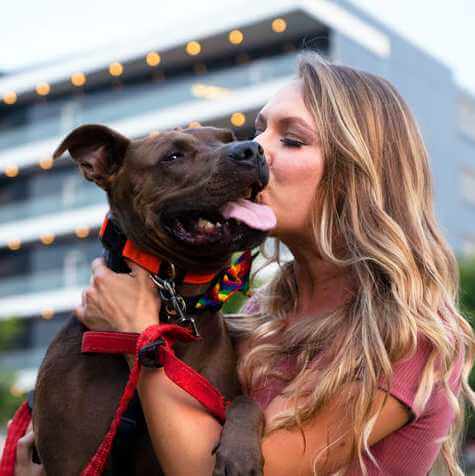In this post:
- Media’s role
- What can you do about the misinformation in the media?
- How to identify good and legitimate informational resources
Breed Specific Legislation or “BSL” is precisely what it sounds like … regulation of your right to own or a dog based solely on the dog’s breed or “type.” While most people associate BSL with laws that ban the ownership of dogs, it also refers to regulations such as muzzling and insurance. And these strict requirements are placed only on owners of specific breeds of dogs.
How does something like BSL get started? Was it a group of concerned animal experts? No. Unfortunately, overdramatic media coverage is usually how BSL gets passed.
Media’s Role
While the media’s role should be to educate us, they typically focus on entertaining or terrifying us. If they reported, “A child walked into a yard of an abused dog and got bitten,” they would get only a small reaction from their readers. However, if they say, “A family Pit Bull attacked a child unprovoked,” their story will get national coverage. Both stories are the same, but one will stir people’s emotions and make them mad. Mad enough to start suggesting legislatures to ban some dog breeds. The media has a motive for what they do, and they do it for financial gain and prestige.
The focus needs to be on the truth behind the story. What really caused an incident like the example above to happen, and what can we do to prevent it from happening again? Reporters rarely investigate what actually happened in these situations; they just want to be able to sell the story and usually at the dog’s expense.
Family dog vs. resident dog
“When you read that article, and it says, a family dog turned on somebody, regardless of the type of dog, please look into that and make sure that you know that dog was not a family dog, but it was indeed a resident dog living in squalor, and no dog should live like that.” – Deirdre ‘Little Darling’ Franklin, MSPP

Family Dog
“A family dog is a dog like this guy right here, who gets to come inside live in a place where he’s comfortable, fed, and well taken care of and loved.” – Deirdre ‘Little Darling’ Franklin, MSPP
Resident Dog
“A dog that is a resident dog is a dog that lives outside usually on a chain in extremely difficult temperatures. Usually, they don’t have a dog house or a place to go and get away from the sounds of nature, the sounds of people, and that dog has never had a break.” – Deirdre ‘Little Darling’ Franklin, MSPP
Banning dogs is not going to solve the problem because there is no one specific breed responsible for causing the damage. However, as we talked in Problem With Bite Statistics, there is no easy way to identify a breed. People are not reporting all the bites, and statistics are an unreliable way to measure what is really going on.

What can you do about the misinformation in the media?
If you come across a piece of media that is sharing information you know to be inaccurate, you have the right to reach out to and share the correct information.
The best way to do this is to research the journalist who wrote the piece or the publication they work for. When you find contact information, do not immediately call or email with insults and blame about how you think their article is terrible. Remain calm and respectful, letting them know that they shared inaccurate information and the harm that can cause. Share your sources with them, and encourage them to continue educating themselves about the topic.
How to identify good and legitimate informational resources
It’s essential when reading an article about BSL and dog behavior to make sure that the source of publishing the material is legitimate.
And this does not mean that every article needs to be written by a college professor or industry expert! You just want to make sure that the author is sighting legitimate sources, and not only blogs written by enthusiasts or amateurs like them.
Georgetown Univesity compiled an excellent list for evaluating internet resources:
Is it objective?
- Is the information covered fact, opinion, or propaganda?
- Is the author’s point-of-view objective and impartial?
- Is the language free of emotion-arousing words and bias?
- Is the author affiliated with an organization? Does the author’s affiliation with an institution or organization appear to bias the information?
- Does the content of the page have the official approval of the institution, organization, or company?
Is it accurate?
- Are the sources for factual information clearly listed so that the information can be verified?
- Is it clear who has the ultimate responsibility for the accuracy of the content of the material?
- Can you verify any of the information in independent sources or from your own knowledge?
- Has the information been reviewed or refereed?
- Is the information free of grammatical, spelling, or typographical errors?
Is it reliable and credible?
- Why should anyone believe information from this site?
- Does the information appear to be valid and well-researched, or is it unsupported by evidence?
- Are quotes and other strong assertions backed by sources that you could check through other means?
- What institution (company, government, university, etc.) supports this information? If it is an institution, have you heard of it before? Can you find more information about it?
- Is there a non-Web equivalent of this material that would provide a way of verifying its legitimacy?
How current is the information?
- If timeliness of the information is important, is it kept up-to-date?
- Is there an indication of when the site was last updated?
Links
- Are links related to the topic and useful to the purpose of the site?
- Are links still current, or have they become dead ends?
- What kinds of sources are linked?
- Are the links evaluated or annotated in any way?
Final thoughts:
No matter the type of BSL in a community, it targets all dogs of a specific breed – the innocent and the guilty – and removes the responsibility from the dog’s owner and places it on the dog itself. Laws are created to punish or deter humans’ actions – not those of animals – and the failure to recognize the integral role or irresponsible ownership is the biggest reason that breed-specific legislation fails.
I encourage you to use the facts about BSL, pit bulls, and dog safety on this site to arm yourself with information and join the fight against this discriminatory legislation.
Special thanks to:

Deirdre ‘Little Darling’ Franklin, MSPP
Deirdre “Little Darling” Franklin is the founder, president, and soul behind Pinups for Pitbulls. She holds a master’s degree in public policy from Drexel University, where she specialized in breed-specific legislation. She is also the Volunteer & Foster Manager for the ASPCA Behavioral Rehabilitation Center in Weaverville, NC.

Drayton Michaels, CTC is the owner of Urban Dawgs Dog Training in Red Banks, NJ. He also holds a Certification in Dog Training and Behavior Counseling from the San Francisco SPCA Academy for Dog Trainers.





